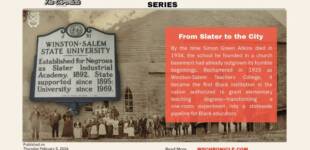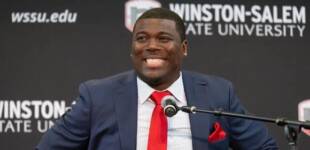WFU sets the record straight on Trump’s exclusion order
Local immigration lawyer Helen Parsonage talks about the local impact of the TrumpAdministration’s exclusion order.
Photo by Tevin Stinson
BY TEVIN STINSON
THE CHRONICLE
Exactly one week after President Donald Trump signed an executive order banning travel to the U.S. from seven Muslim majority countries (Iraq, Iran, Syria, Libya, Yemen, Somalia and Sudan), 300 students on the campus of Wake Forest University crammed into the Pugh Auditorium to find what the 90-day ban really means.
During the event held last Friday, a panel of Wake faculty members opened up to share their thoughts and professional expertise on the topic. To jumpstart the discussion, WFU Law Professor Margaret Taylor said Trump’s executive order is nothing more than an exclusion order unlike anything the country has ever seen before. She mentioned although President Obama did order a review of all screening procedures of people from Iraq in 2011, he did not sign an exclusion order as some media outlets have reported.
Taylor said, “During the Obama Administration, we did have new procedures put into place but, contrary to what you might have heard from some news reports, it’s simply not true that Obama or any other prior president has signed an exclusion order like this one.”
According to Taylor, on the same day Trump signed the order, the state department revoked visas already issued to individuals from the seven banned countries. She said although the order only stands for 90-days, the effects of the order will linger long after that.
“The suspension of visas means that the people who waited years to receive them have to start that process over again,” said Taylor. “So, that’s just one of many reasons why it’s not accurate to say this is just a temporary exclusion or inconvenience.”
While discussing the local impact of the order, immigration lawyer Helen Parsonage said she has a number of clients here who are Iraqi and Syrian citizens who have been separated from their families. She said several them have even filed for asylum in this country based on religious persecution but the law prohibits them from filing for a work permit.
“I have clients who have temporary work permits and if this ban stays in place for any amount of time, their permits will expire, which means they lose their jobs,” continued Parsonage. “These are people with small children. This is having a real impact on a lot of people. This is not just an inconvenience to 100 people.”
Sociology Professor Hana Brown, and a professor in the department of politics and international affairs, Hank Kennedy, also participated in the panel discussion. To wrap up the event, students and others in attendance had the opportunity to ask the panel their own questions about the executive order, immigration laws, and the future of the country.
When asked about the “cost” of the order, Kennedy said, “It would really benefit the country to end this because there really isn’t an issue of security with respect to those that have immigrated to the United States.
“The cost of these policies that continue to generate out of the creative minds of people like [chief White House strategist and senior counselor Steve] Bannon and [White House national security adviser Michael] Flynn are causing an enormous cost to U.S. security and interest,” he continued. “There is a lot of cost and it will take years to straighten out.”









